Manoeuvering safely amid global adversity
In contrast to one year ago when the National Assembly (NA) set an economic growth target of 6-6.5 per cent for 2022 and the government followed suit with a new goal of 7 per cent, the government last week reported to the National Assembly Standing Committee (NASC) that the economy “may grow about 8 per cent this year, laying an important foundation for the nation to implement the 6.5-7 per cent economic growth target set in the Socioeconomic Development Plan for 2021-2025.”
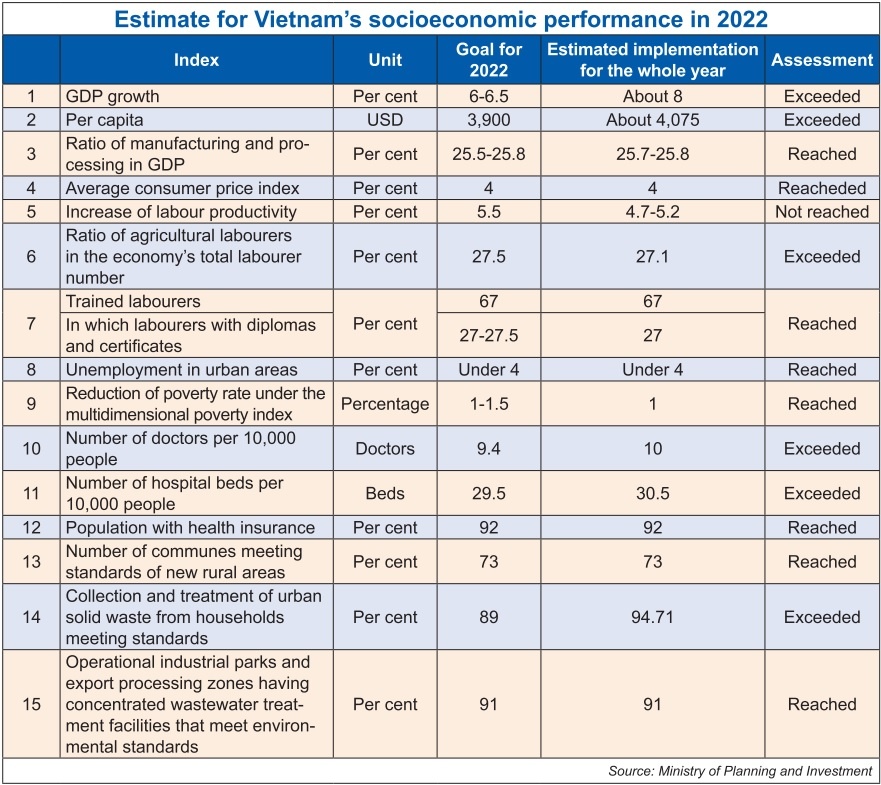 |
This would mean GDP for 2022 will be about $408.41-410.6 billion, higher than the $368.68 billion of last year.
“According to the National Assembly Economic Committee’s report on appraising the government’s report on Vietnam’s economic situation for 2022, in this year so far, the domestic economy has weathered difficulties to recover and develop strongly,” said NA Vice Chairman Nguyen Duc Hai.
“The NA highly appreciates the government’s great efforts in economic monitoring. The committee agreed that the government’s report, after some amendments and supplementation, can be submitted to the legislature for approval.”
The fourth session of the 15th NA will open this week and last until November 15 in Hanoi. According to updated figures from the government, after growing 5.05 per cent in Q1 2022, the economy bounced back to 7.72 per cent in Q2, and an impressive 13.67 per cent in Q3.
In the first nine months, it grew 8.83 per cent against the 1.42 per cent in the same period last year, and only 2.12 per cent in that of 2020 – representing the biggest 9-month increase in terms of rate within 11 years.
Strong recovery
Minister of Planning and Investment Nguyen Chi Dung reported to the NASC last week that the 9-month growth rate of 8.83 per cent has been more optimistic than all already-devised growth scenarios.
“Such a surprising recovery has been demonstrated in all three key economic sectors. Specifically, it is calculated that in 2022, the economy’s index of industrial production will increase 9-9.5 per cent; the total goods retail and consumption service revenue will climb 18.3 per cent; and the gross agricultural output value will expand about 3 per cent,” the minister revealed.
In the first nine months of 2022, the agro-forestry-fishery expanded 2.99 per cent on-year – creating 4.04 per cent of GDP, while the on-year growth rate of the industry and construction sector was 9.44 per cent – responsible for 41.79 per cent of GDP, and the on-year growth rate of service sector was 10.57 per cent – holding 54.17 per cent of GDP.
“The manufacturing and processing sector has continued serving as the key growth impetus of the economy, climbing 10.69 per cent on-year in the first nine months. The economic recovery and development among regions and localities are relatively equal,” said Minister Dung.
Echoing with the government’s 2022 socioeconomic report, NA Standing Vice Chairman Tran Thanh Man also highlighted the achievements. “Since early this year, despite massive difficulties, the 9-month socioeconomic picture has generally been painted with bright colours which promise quite a positive landscape for the entire year,” he said. “This is attributed to great efforts made by the whole political system, in which the decisive role has been played by the direction of the Politburo, the Party Secretariat, the Party Central Committee, and by the proactivity and efforts made by the NA, the NASC, and the government, as well as localities, people, and the business community, and support from the international community.”
The government last week also underlined the international community highly appreciating such achievements, which have prompted them to have positive assessments for the country.
Last week, Standard Chartered Bank raised its Vietnam GDP growth forecast for 2022 to 7.5 per cent from the previous 6.7 per cent and for 2023 to 7.2 from 7 per cent to reflect robust Q3 growth of 13.67 per cent on-year. Q4 2022 growth is anticipated at 4 per cent.
Right from May, when the Vietnamese economy was showing big signals for recovery, S&P and Fitch Ratings ranked Vietnam stable and with a positive outlook. In June, Vietnam was the sole nation in the world that the World Bank raised growth forecast from 5.5 to 5.8 per cent for this year. Then two weeks ago, the bank increase this rate to 7.2 per cent.
In late July, the International Monetary Fund (IMF) lifted Vietnam’s economic growth for 2022 from 6 to 7 per cent, while reducing its projection for many other nations. Meanwhile, Singapore’s Chandler Institute of Governance is seeing Vietnam as having a high rank in terms of good government with a strong increase in the index of equal income (up 33 places) and investment attraction (18 places) as compared to 2021.
Moody’s Investors Service on September 6 upgraded the government’s long-term issuer and senior unsecured ratings to Ba2 from Ba3 and changed the outlook to stable from positive.
Also, the Asian Development Bank (ADB) last month released its fresh report on Vietnamese economic outlook, maintaining its favourable economic outlook for Vietnam as it forecast GDP to expand 6.5 per cent this year and 6.7 per cent in 2023.
“Vietnam’s economy is performing reasonably well amid uncertainties in the global economy. Restored global food supply chains will boost agriculture production this year,” the ADB said. “The outlook for the manufacturing sector remains bullish given strong foreign direct investment (FDI) in the sector.”
Figures from the Ministry of Planning and Investment (MPI) showed that during January-September 20, 2022, FDI disbursement marked a record high of $15.43 billion, up 16.3 per cent on-year.
“These positive figures showed that foreign-invested enterprises have been constantly recovering and expanding their production and business activities in Vietnam,” said Do Nhat Hoang, general director of the MPI’s Foreign Investment Agency.
Great caution
The government last week suggested that the economic growth for 2023 should be about 6.5 per cent and per capita GDP should be $4,400.
This will mean that GDP for next year will likely be about $448.25-452.75 billion.
“Based on the estimation that GDP for 2022 will grow about 8 per cent – which is high – and based on forecasts that the domestic and international situations will continue facing with many difficulties including high inflation and economic depression in some countries which will have negative impacts on our economy, we see that our prediction of 6.5 per cent for 2023 is suitable,” explained Minister Dung.
“In such difficulties, we cannot be subjective and inattentive in economic monitoring. We must be steadfast in macroeconomic stability and inflation control, and maximise all advantages for rapid economic recovery and development,” he stressed.
The government forecast that until the end of 2023, the global economy will see grey colours, with growth of only about 3.2 per cent for this year.
“The IMF in April revised down the world economy’s growth to 3.6 per cent in 2023 from 3.4 per cent in its forecast in January. The World Bank in June also followed suit, with its projection down to 3 per cent for this year from its projection of 3.2 per cent in January,” said the government report on Vietnam’s 2022 socioeconomic situation.
“The world economy has been forecast to slow down, with an increase in depression in the short term. High inflation continues lingering in many nations, in addition to climbs in interest rates and policies of monetary tightening and fiscal reduction in many countries,” the report said. “Besides that, the Russia-Ukraine conflict will continue prolonging, affecting fuel prices and costs for transport and logistics, and production supply chains, as well as causing risks to political stability in the region and the wider world.”
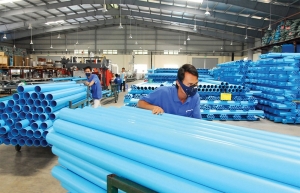 | Vietnam impressing with GDP growth Vietnam is expected to enjoy a bumper economic performance this year with domestic production rising, fuelled by positive growth in the first nine months. |
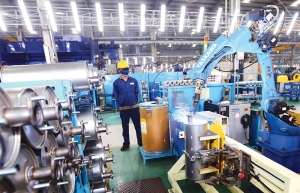 | Spillover FDI effects require levelling up The high share of foreign direct investment in Vietnam’s export turnover, as well as the minor participation of local suppliers, is a warning sign for many macroeconomic experts who advise reducing the dependence on foreign markets and strengthening domestic enterprises in favour of a more sustainable development strategy. |
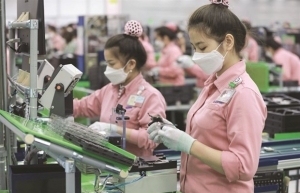 | FDI inflow from RoK helps Vietnam move up global value chain ladder The strong foreign direct investment (FDI) inflow from the Republic of Korea (RoK) has been giving a significant push to Vietnam in the battle to move up the global value chain ladder and promote sustainable development. |
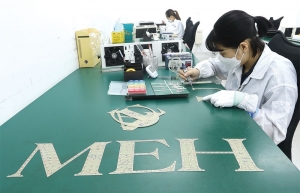 | Better ESG indicators set for FDI projects Vietnam will soon set up environmental, social, and governance indicators to classify foreign direct investment and measure the performance of foreign-invested projects, laying a foundation to make decisions on the mobilisation of the capital inflows. |
What the stars mean:
★ Poor ★ ★ Promising ★★★ Good ★★★★ Very good ★★★★★ Exceptional
 Tag:
Tag:
Related Contents
Latest News
More News
- Hermes joins Long Thanh cargo terminal development (February 04, 2026 | 15:59)
- SCG enhances production and distribution in Vietnam (February 04, 2026 | 08:00)
- UNIVACCO strengthens Asia expansion with Vietnam facility (February 03, 2026 | 08:00)
- Cai Mep Ha Port project wins approval with $1.95bn investment (February 02, 2026 | 16:17)
- Repositioning Vietnam in Asia’s manufacturing race (February 02, 2026 | 16:00)
- Manufacturing growth remains solid in early 2026 (February 02, 2026 | 15:28)
- Navigating venture capital trends across the continent (February 02, 2026 | 14:00)
- Motivations to achieve high growth (February 02, 2026 | 11:00)
- Capacity and regulations among British areas of expertise in IFCs (February 02, 2026 | 09:09)
- Transition underway in German investment across Vietnam (February 02, 2026 | 08:00)




















 Mobile Version
Mobile Version